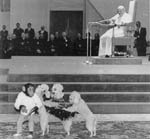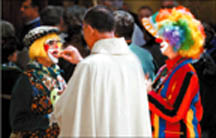The truth of course is that it has gone to the dogs and is being run by monkeys:

"papal" audience of Wednesday, March 24, 2004
Posted on 03/26/2004 6:47:24 PM PST by Land of the Irish
Helen (a pseudonym) describes herself as devoutly Catholic. She attends St. Anne's Parish Community in Discovery Bay in the diocese of Oakland. Most parishioners there, she says, are excited about the changes in the parish made by their pastor, Father Ron Schmit -- who is also chairman of the art and design committee (formerly referred to as the liturgy committee) for the new Oakland cathedral.
Helen, though, told me a few of the things that bothered her about the parish. For one thing, she said, Father Schmit is very proud that he will be acquiring for the parish a crucifix with a fully naked Jesus. (Another parishioner I talked to joked that perhaps this was Father's way of teaching the pope's Theology of the Body). Another thing that angered Helen happened at Christmas Eve Mass, when two girls, between the ages of ten and twelve, pretending to be Joseph and Mary, danced at Mass to a song with the words, "would you pick some grapes from the tree." Their dresses, Helen said, had slits that went up to the waist.
According to Helen, St Anne's sometimes uses leavened bread for its hosts. "It rose and was sweeter than it should be," she said. "My mother called the rectory, and they insist it's unleavened. They got the recipe off the internet."
Helen is not alone in her confusion about what is happening at her church.
Joyce Davis lived in Discovery Bay for six years, up until 2002, and was a parishioner of St. Anne's. She told me that the pastoral associate, Gail McGuire, reads the Gospel once a month at the Children's Mass and delivers the homily. Davis said she received a letter from Father Schmit in which he said that the reason McGuire does this is that she is "good with children" -- even though the children troop out of the church for the Liturgy of the Word. Once McGuire, said Davis, conducted a Eucharistic service (no Mass) and instructed everyone to bring his chair closer to the altar, thus forming a circle. "Everyone took their own Jesus from the ciborium. I couldn't do it," said Davis. "The Eucharist is something given, not taken."
Joyce also informed me that Father Schmit "pulled the kneelers, and pews out of the church, and had a garage sale." She also said Father Ron wrote in the Contra Costa Times in support of gay marriages. In the March 12, 2000 edition of the Contra Costa Times, Father Ron is quoted as being "saddened" that the bishops supported Proposition 22 banning gay marriages in California. He argued that divorce is also condemned in the Bible, but no one is clamoring to make divorce illegal.
According to Joyce, Father Schmit once said, "the Bible is just a bunch of stories." She said he often uses the term "Spirit of Vatican II" to justify his actions. Furthermore, as if Catholic moral teaching were simply suggestions, she claimed Schmit said, "in a perfect world, we could all follow the catechism".
In early February, Schmit delivered a controversial sermon regarding the nature of the parish as well as the priesthood. At the request of parishioners, within the bulletin he distributed a flier that lists the source material he used for his sermon, which Helen faxed to me. Among his sources was a book written by William J. Bausch, called The Parish of the Next Millenium. According to Helen, Schmit recommends this book to those interested in getting involved with ministry.
Schmit's handout includes the following quotations from Bausch's book: "The parish of the Christian millenium will be lay oriented, with shared and collaborative ministry." "It will be grounded not so much in ordination and office as in baptism and charism, wherein the baptismal call to discipleship binds believers in a common mission, and leadership, conferred with broader input, is respectful of others' gifts and ministries." "It will complete the process of moving from a pyramid to a koinonia (communion) church, with a better balance between male and female spiritualities and influence, greater female representation in decision making; there will be married priests and communion with one another across the earth, those gone before and those to come after." "It will stress the wisdom tradition rather than the intellectual, retrieve the mystical and return to a more holistic spirituality." "It will see a new priesthood within and among the people, a common communion in ministry." "It will move closer to a male-female partnership, a real balance of male-female cooperation and ministry."
After these quotations, the handout has these comments from Father Schmit: "Although these predictions by Fr. Bausch may not be realized as of yet, or as quickly as one might hope, nevertheless they should inspire and move all who minister for Jesus in the daily grind that is our human existence."
According to Helen, Father Schmit's teachings are very well received because, as she put it, many in the parish want to "get away from the authoritarian church" and have "lay people making decisions."
Another handout contained a "psalm," titled, "Do This in Memory of Me," from a book, Psalms for Zero Gravity by Edward Hays (Forest of Peace Publishing). The psalm begins: "Beloved Jesus, Lord of the Meal, I rejoice that a mother and a father, laboring for their family, begin and end each day's work saying, 'This is my body, this is my blood.' An adult child nursing a sick elderly parent with compassion and patient care says 'This is my body, this is my blood.'" The "psalm" then lists a preacher, a singer "forgetting self and the audience, making love out of the music," an artist, teacher, dancer, doctor, auto mechanic, office worker -- and all in their work say, "This is my body, this is my blood." In the last verse of the psalm, we learn that "ten thousand thousand consecrations occur daily, as all heaven's angels chime in, 'Holy, holy, holy,' to the thunderous praise of a thousand silent, silver bells. Listen. Listen."
Father Schmit's handout explains the "psalm" in the following "reflection": "Some theologians as late as the twelfth century held that there was no necessary connection between the consecration of bread and wine into Christ's Body and Blood and sacramental ordination. Gary Macy, chairman of the theology department of the University of San Diego and a scholar of the medieval period, discovered that the first document making a distinction between laity and ritually ordained clergy didn't appear until the Fourth Lateran Council of 1215."
Schmit's explanation continues: "To frequently make a gift of yourself in loving compassionate service is being faithful to Jesus, keeping the memory of his gift alive and doing what he did. While his gift-words are officially restricted to the ordained clergy today, Jesus' last request on the night before he died was restricted to neither time nor place, person nor circumstance. We all are called at every moment to live out that request."
I called St Anne's several times to ask Father Schmit to comment for this article. No one returned my calls.
The truth of course is that it has gone to the dogs and is being run by monkeys:

"papal" audience of Wednesday, March 24, 2004
On the contrary, it is most likely the most innocent thing present today in what has tragically become a satanic pit.
As Pope Paul IV so aptly quoted the Prophet Daniel:
The Abomination of the Desolation in the Holy Place.
Do you care to elaborate why a naked crucifix would be preferable?
A good eye!
Any idea who these clowns are?

St. James the Greater Church, Dogtown, Missouri, March 17, 2004
Maybe because, the majority of Amchurch bishops and priests would find it "enjoyable".
Yes, from left to right, McCarrick and O'Malley.
These "Irish" prelates really make me proud of my ancestry.
Disclaimer: Opinions posted on Free Republic are those of the individual posters and do not necessarily represent the opinion of Free Republic or its management. All materials posted herein are protected by copyright law and the exemption for fair use of copyrighted works.